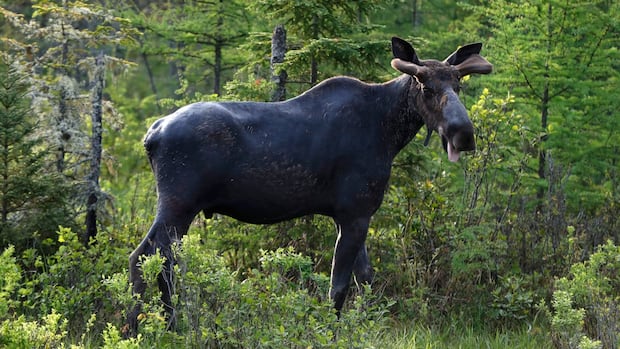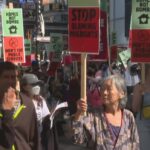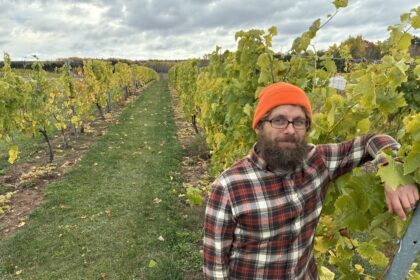ManitobaPimicikamak Cree Nation in northern Manitoba is urging moose hunters to return their licences to the province this year over concerns of population scarcity and loss of access to traditional hunting territory.’This is the ultimate broken promise,’ says lawyer for northern Manitoba First NationLauren Scott · CBC News · Posted: Sep 20, 2025 5:46 PM EDT | Last Updated: 43 minutes agoPimicikamak Cree Nation in northern Manitoba says it ‘does not provide any consent or permission’ for use of moose-hunting licences in its traditional territory. (Robert F. Bukaty/The Associated Press)Pimicikamak Cree Nation is urging moose hunters in Manitoba to return their licences to the province this year over concerns of population scarcity and loss of access to traditional hunting territory. “Most people who come and hunt are maybe seeing it more as a game than subsistence,” David Monias, chief of the First Nation about 530 kilometres north of Winnipeg, said Saturday.”Moose hunting is part of our way of subsistence.” In a full-page ad published in the Winnipeg Free Press on Saturday, the First Nation said it “does not provide any consent or permission for the use of any licence issued by Manitoba.”Pimicikamak citizens have “a first priority to hunt moose for food,” the ad states, alleging the province has violated treaty rights and the Northern Flood Agreement by issuing licences after Pimicikamak leadership warned of low moose numbers and the unmet food needs in the First Nation.Pimicikamak took out similar ads in the Free Press, the Opasquia Times and the Thompson Citizen last year, urging hunters to return their licences in “in the spirit of reconciliation.” Pimicikamak Cree Nation Chief David Monias says the province has violated promises laid out in the Northern Flood Agreement by issuing moose-hunting licences in the First Nation’s traditional territory. (Prabhjot Singh Lotey/CBC)Under the Northern Flood Agreement — signed in 1977 by a group of northern Manitoba First Nations, the federal and provincial governments and Manitoba Hydro — the province agreed First Nations would have first priority to all wildlife resources within their traditional trapline zones and territories.”That means that until their food needs are met, no licence hunting, no outfitting licences should be issued,” said Byron Williams, a lawyer who represented Pimicikamak in hearings over hunting licences last year. Pimicikamak’s traditional territory, also known as the Cross Lake resource area, spans nearly 15,000 square kilometres over parts of four of the province’s game-hunting areas: 9, 9A, 3 and 3A. Earlier this year, Natural Resources Minister Ian Bushie said the province would grant a total of 350 moose hunting licences across four game-hunting areas: 9A, 10, 15 and 15A.Licensed hunting is banned in small portions of areas 9A and 10 this year to prioritize Indigenous hunters, according to this year’s provincial hunting guide. Monias said Pimicikamak hunters have had to fly as far as Saskatchewan to harvest moose due to low numbers in their traditional territory.It’s unclear how many moose are on Pimicikamak’s traditional territory after a summer of wildfires, he said. He wants the province to do an aerial assessment to check population numbers before allowing licensed hunters in. Williams said the First Nation has been urging the province to keep its hunting promises under the Northern Flood Agreement since 2022. Nearly a year ago, the lawyer represented Pimicikamak in a legal hearing overseen by Court of King’s Bench Justice Brian Bowman about how the Manitoba government awards moose-hunting licences to non-Indigenous hunters.The Manitoba Wildlife Federation, an advocacy group for hunters in the province, and provincial lawyers also submitted arguments before the judge last November.Williams says no decision has been made. The Northern Flood Agreement promised Pimicikamak “first priority and to prohibit hunting if there’s not enough moose,” said Williams.”We haven’t honoured our part of the bargain to give first priority, top priority, to the citizens of Pimicikamak so they can meet their food needs,” he said. “This is the ultimate broken promise.”Pimicikamak’s renewed call for hunters to return their licences comes after Misipawistik Cree Nation sued the province over issuing moose hunting licences in its territory, and Bloodvein First Nation set up a buffer zone barring non-Indigenous hunters, including those with valid licences, from entering their lands. CBC News reached out to the province for comment but did not immediately receive a reply.ABOUT THE AUTHORLauren Scott is a Winnipeg-based reporter with CBC Manitoba. They hold a master’s degree in computational and data journalism, and have previously worked for the Hamilton Spectator and The Canadian Press.With files from Felisha Adam
Friday, 6 Feb 2026
Canada – The Illusion
Search
Have an existing account?
Sign In
© 2022 Foxiz News Network. Ruby Design Company. All Rights Reserved.
You May also Like
- More News:
- history
- Standing Bear Network
- John Gonzalez
- ᐊᔭᐦᑊ ayahp — It happened
- Creation
- Beneath the Water
- Olympic gold medal
- Jim Thorpe
- type O blood
- the bringer of life
- Raven
- Wás’agi
- NoiseCat
- 'Sugarcane'
- The rivers still sing
- ᑲᓂᐸᐏᐟ ᒪᐢᑿ
- ᐅᑳᐤ okâw — We remember
- ᐊᓂᓈᐯᐃᐧᐣ aninâpêwin — Truth
- This is what it means to be human.
- Nokoma











